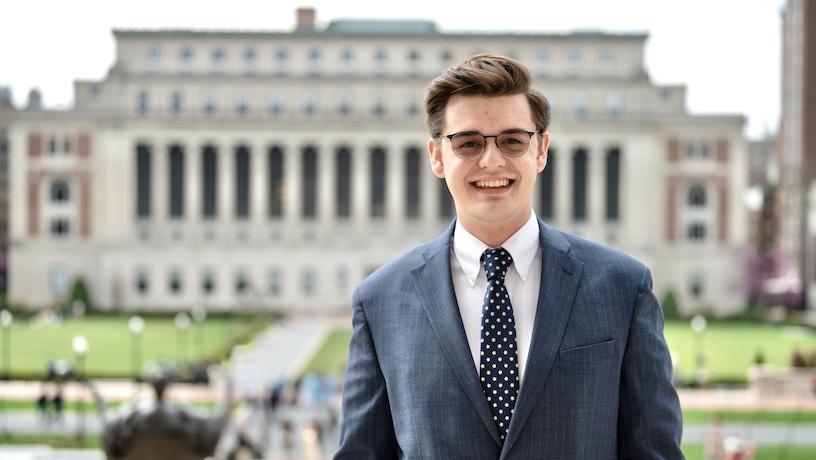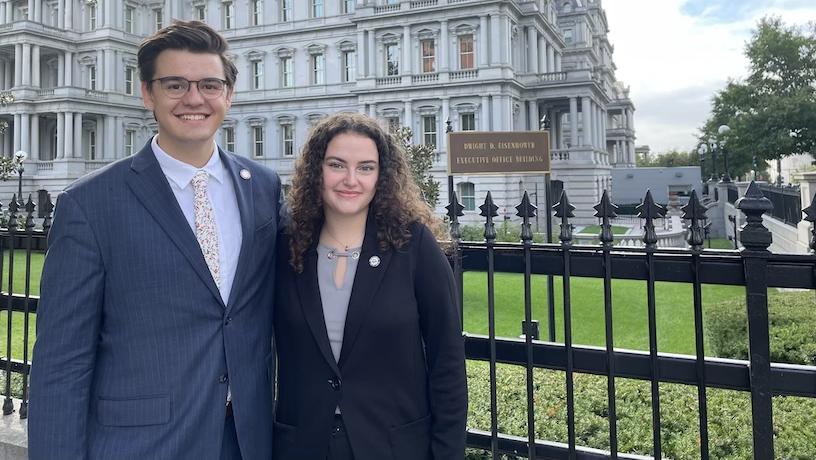Climate Changemaker
Senior Andrew Fagerheim’s commitment to climate solutions has reached a global audience.

From early days as a member of his high school environmental club to attending global climate summits, Andrew Fagerheim has turned his passion for the climate and environment to an academic and career path in climate advocacy, education, and research.
A senior at Columbia Engineering majoring in earth and environmental engineering, Fagerheim joined the Youth Climate Program at the Wild Center his sophomore year of high school. A science-based organization, the Wild Center works to convene, engage, connect and empower young people around the world to take action on climate change.
“These programs introduced me to both climate science and climate solutions … to ideas like how climate change is affecting our region and what resources young people have to make a difference,” said Fagerheim, who is an advisory board member for the Youth Climate Program.
In September, Fagerheim attended the White House Summit on Building Climate Resilient Communities in D.C. The summit included representatives from more than 25 states, territories, and Tribal Nations and is a part of the Biden administration’s commitment to finding solutions to reduce greenhouse gas emissions and to address climate threats through community-driven strategies. With administrators aware of functional local models, the summit reflected discussions with different community leaders on the resources needed to scale solutions to the global community.
Fagerheim participated in a roundtable discussion focused on scientific solutions, and the data and technical assistance needed for initiating these programs. “We discussed questions such as, what should the relationship be between local organizations and the federal government? In what ways have those relationships not worked well in the past, and what can we do to make them more effective? It felt like it was right at the intersection of climate education and research,” he said. “I wasn't expecting it to feel as relevant as it did, so that was cool to see.”
Fagerheim has been heavily involved in climate action initiatives within his community, even as a young kid growing up in Homer, NY.
In the tenth grade, he led a climate initiative to install a solar charging station in the local school library and wrote grants to pay for solar panels and batteries. Seeing the intersection of climate and technology firsthand, Fagerheim was interested in the technical skills, science, and engineering required to implement climate solutions, which is what led him to Columbia Engineering.
From local advocacy to global impact, Fagerheim continued his interest in climate education and environmental engineering at Columbia. As part of his role as an advisory board member for the Youth Climate Program, he travels around the world speaking at youth climate summits, elevating youth voices and educating the next generation of climate advocates. In addition to the D.C. summit this fall, he attended the 2021 UN Climate Change Conference in Glasgow, Scotland.

Andrew Fagerheim (left) with fellow Youth Climate Advisory Board member, Cedar Young, a senior at St. Lawrence University. Both pictured in D.C. for the White House Summit on Building Climate Resilient Communities held in September. Credit: The Wild Center
When he’s not traveling around the world speaking at climate summits, Fagerheim’s drive for climate advocacy turns into action when he’s a student in the lab.
In the summer of 2022, he began working at Lamont-Doherty Observatory in Dhruv Balwada’s ocean stirring and mixing lab. Balwada’s lab focuses on understanding how the stirring of swirling flows in the ocean play an integral role in influencing the Earth’s climate, utilizing machine learning tools to parameterize the ocean turbulence.
While climate advocacy, education, and research cover different aspects of solving climate change, the interdisciplinary work that goes into fighting climate change are all essential to creating a greener future. “I was just talking with someone who asked a question along the lines of, ‘Is science enough?’ And my answer was no,” Fagerheim said. “Science tells us about the world, how the world works, what sort of systems are, how they're changing. But it doesn't always tell us what we should do with that information - and that's where disciplines like engineering, policy, and education come in.”
After graduation, Fagerheim hopes to continue his research on climate science and technology by pursuing graduate education in environmental sciences. While he plans to combine his interest in advocacy with his work in ocean and climate research, Fagerheim has a hopeful outlook for the industries working to combat climate change.
“There's a way to look at all these moving parts as discouraging, and that's totally valid. But I think there's also a way to look at [the climate problem] in that it means everybody has the opportunity to play a role too. And I think that can be exciting.”
